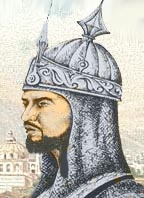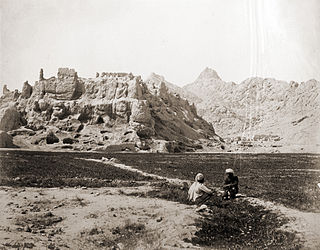See also
| This disambiguation page lists articles associated with the title Hotak. If an internal link led you here, you may wish to change the link to point directly to the intended article. |
The Hotak is a tribe of the Ghilji confederacy of the Pashtun people.
Hotak may also refer to:
| This disambiguation page lists articles associated with the title Hotak. If an internal link led you here, you may wish to change the link to point directly to the intended article. |

Kandahar or Qandahar is a city in Afghanistan, located in the south of the country on the Arghandab River, at an elevation of 1,010 m (3,310 ft). It is Afghanistan's second largest city after Kabul, with a population of about 614,118. It is the capital of Kandahar Province and also the center of the larger cultural region called Loy Kandahar. In 1709, Mirwais Hotak made the region an independent kingdom and turned Kandahar into the capital of the Hotak dynasty. In 1747, Ahmad Shah Durrani, founder of the Durrani dynasty, made Kandahar the capital of the Afghan Empire.

The Hotak dynasty was an Afghan monarchy of the Ghilji Pashtuns. It was established in April 1709 by Mirwais Hotak who lead a successful revolution against their declining Persian Safavid overlords in the region of Loy Kandahar in what is now southern Afghanistan. It lasted until 1738 when the founder of the Afsharid dynasty, Nader Shah Afshar, defeated Hussain Hotak during the long siege of Kandahar. Subsequently, Nader Shah Afshar, began reestablishing Iranian suzerainty over regions lost decades before to the Iranian archrival, the Ottoman Empire, and the Russian Empire. At its peak, the Hotak dynasty ruled briefly over an area which is now Afghanistan, Iran, western Pakistan, and some parts of Tajikistan and Turkmenistan.

Mīrwais Khān Hotak, also known as Shāh Mirwais Ghiljī, was an influential tribal chief of the Ghilji Pashtuns from Kandahar, Afghanistan, who founded the Hotak dynasty that existed from 1709 to 1738. After revolting and killing the Safavid Persian governor over the region, Gurgin Khan in April 1709, he declared the Loy Kandahar region in what is now southern Afghanistan independent. He is widely known as Mīrwais Nīkə or Mīrwais Bābā in the Pashto language.
Ghulan Mohammed Hotak is a citizen of Afghanistan.
Musa Hotak is an Afghan military leader and politician from Maidan Shar of Wardak Province. He and his brother Ghulan Mohammed Hotak played prominent roles in the resistance to the Soviet occupation. They were not original members of the Taliban, but joined it when it was gaining power during the civil war that followed the overthrow of the communist regime.

Shāh Ashraf Hotak,, also known as Shāh Ashraf Ghiljī, son of Abdul Aziz Hotak, was the fourth ruler of the Hotak dynasty. An Afghan from the Ghilji Pashtuns, he served as a commander in the army of Mahmud Hotak during his revolt against the heavily declining Safavid Persians. Ashraf also participated in the Battle of Gulnabad. In 1725, he briefly succeeded to the throne to become Shah of Persia after he killed his cousin Mahmud.

Tarinkot District, also spelled as Tarin Kowt, is a district of Uruzgan Province, Afghanistan. The capital of the district and the province is the town called Tarinkot.
Atghar District is a district of Zabul Province in southern Afghanistan. It had a population of about 8,400 in 2013.
Mezana or Mizan is a district of Zabul Province in southern Afghanistan. It has a population of about 13,400 as of 2013.
Qalat District is a district of Zabul Province in southern Afghanistan. Its district seat is Qalat, the capital of the province. It has a population of about 34,300 as of 2013.

Shahjoy District is a district of Zabul Province in southern Afghanistan. It has a population of about 56,800 as of 2013. It is located in the eastern part of the province, next to Ghazni Province.
Nāzo Tokhī, commonly known as Nāzo Anā, was an Afghan poetess and a writer in the Pashto language. Mother of the famous early-18th century Afghan King Mirwais Hotak, she grew up in an influential family in the Kandahar region. She is remembered as a brave woman warrior in Afghan history and as the "Mother of the Afghan Nation".
The Hotak or Hotaki (هوتکي) is a tribe of the Ghilji confederacy of the Pashtun people. The Hotak started centuries ago as a political family. The first king to take power in Kandahar, Afghanistan, was Mirwais Hotak (1673–1715). After his death many different Hotaks took the throne, such as Mahmud Hotak, Ashraf Hotak, and Hussain Hotak, eventually losing control.

Shah Hussain Hotak,, son of Mirwais Hotak, was the fifth and last ruler of the Hotak dynasty. An ethnic Pashtun (Afghan) from the Ghilji tribe, he succeeded to the throne after the death of his brother Mahmud Hotak in 1725. He was also a Pashto language poet. While his cousin Ashraf ruled most of Persia from Isfahan, Hussain ruled Kandahar,but was defeated.
Shāh Abdul Azīz Hotak was the second ruler of the Ghilji Hotak dynasty of Kandahar, in what is now the modern state of Afghanistan. He was crowned in 1715 after the death of his brother, Mirwais Hotak. He is the father of Ashraf Hotak, the fourth ruler of the Hotak dynasty. Abdul Aziz was killed in 1717 by his nephew Mahmud Hotak.
Amir Hamza Hotak is an Afghan cricketer. He is a right-handed batsman who bowls slow left-arm orthodox.

Old Kandahar is a historical section of the city of Kandahar in southern Afghanistan. It is thought its foundation was laid out by Alexander the Great in 330 BC under the name Alexandria Arachosia. and served as the local seat of power for many rulers in the last 2,000 years. It became part of many empires, including the Mauryans, Indo-Scythians, Sassanids, Arabs, Zunbils, Saffarids, Ghaznavids, Ghorids, Timurids, Mughals, Safavids, and others. It was one of the main cities of Arachosia, a historical region sitting in Greater Iran's southeastern lands and was also in contact with the Indus Valley Civilization. The city has been a frequent target for conquest because of its strategic location in Southern Asia and Central Asia, controlling the main trade route linking the Indian subcontinent with the Middle East, the rest of Central Asia and the Persian Gulf.

On 21 January 2019, in central Afghanistan, the Taliban attacked a military compound in Maidan Shar, killing officers of the Afghan National Directorate of Security. The Taliban attacked while engaging in the process of negotiating a truce with the United States. The attack began when an explosives-laden car rammed through a military checkpoint and onto the grounds of the compound, where the vehicle detonated. After the explosion, two gunmen entered the base and opened fire on Afghan soldiers, before the two were shot down. A senior official in the Afghan defense ministry said that 126 people were killed in the explosion. The Taliban claimed responsibility and stated that over 190 people were killed in the attack. The Afghan National Directorate of Security (NDS) reported that 36 military personnel were killed in the attack. Afghan president, Ashraf Ghani condemned the attack and said that the 'Afghan intelligence agency personnel were target of the attack'.